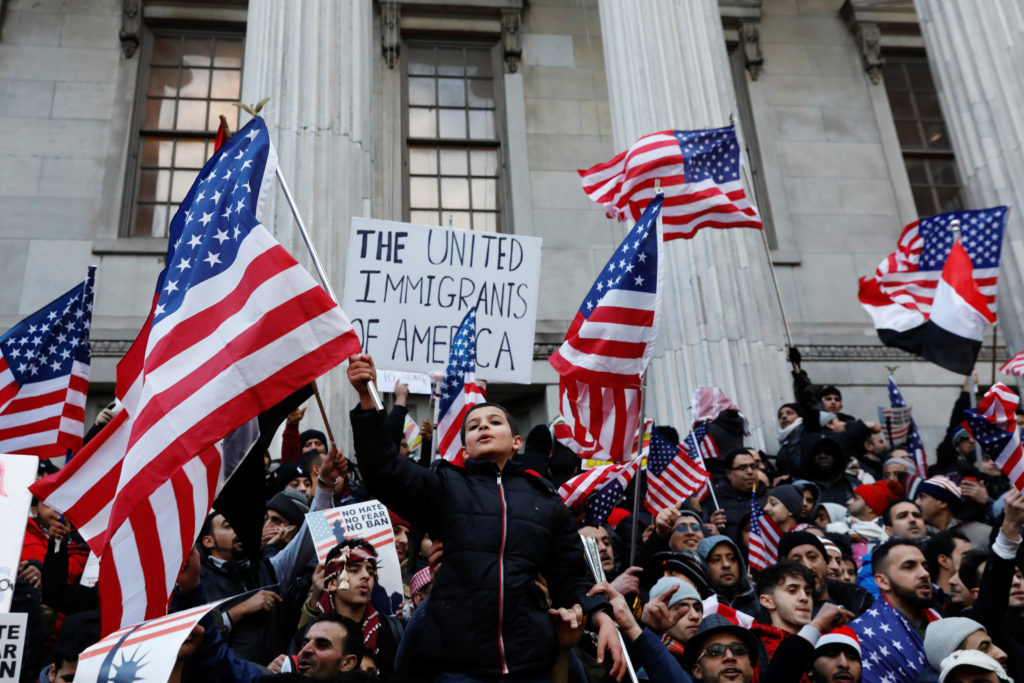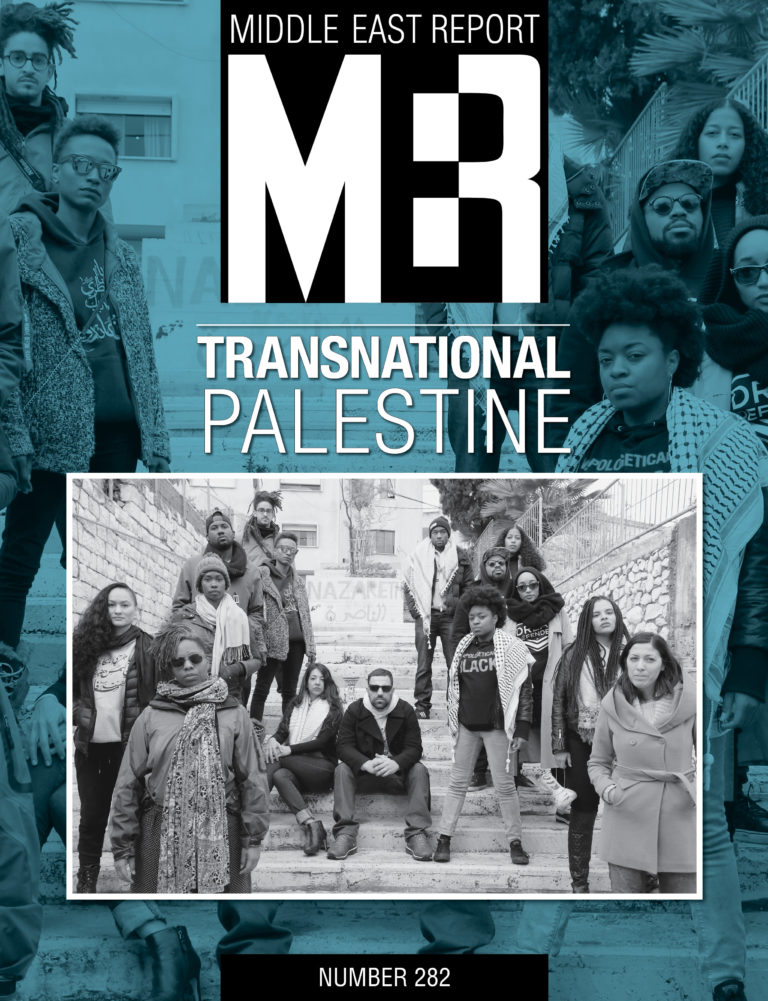
Demonstrators participate in a protest by the Yemeni community against President Trump’s travel ban in Brooklyn, New York, February 2, 2017. Lucas Jackson/Reuters
Arguably the most incisive report in any publication about the US government’s persecution of Arab Americans appeared in February 1973 when MERIP Reports (the precursor to Middle East Report) published Joe Stork and René Theberge’s article on the Operation Boulder program. The program, initiated by the Nixon administration, targeted politically active Arabs in the United States with surveillance and visa restrictions in the wake of the murder of Israeli athletes at the 1972 Olympics in Munich by the Palestinian group Black September. Revealing the government’s systematic violations of Arab Americans’ civil liberties, Stork and Theberge uncovered more details about US government policies—such as coordination between the Immigration and Naturalization Service (INS) and the FBI and the political interrogations of Arab college students—than did the paltry reporting by the mainstream press.
Over the decades, MERIP continued to spotlight the ways that Arab Americans have been ensnared in the US government’s diplomacy with Arab nations and Israel and unjustly stereotyped and treated as threats and terrorists. For example, in 1986 MERIP interviewed the president of the American-Arab Anti-Discrimination Committee (ADC) Abdeen Jabara about bigotry and violent attacks on Arab Americans, including the assassination of ADC leader Alex Odeh in California. MERIP also regularly covered the infuriating and drawn-out case of the “Los Angeles Eight,” beginning with their initial arrest in 1987. US authorities targeted seven Palestinians and one Kenyan residing in Los Angeles on the pretext of their supposed association with a Palestinian group considered “terrorist” by the US government. This coverage continued throughout the 1990s, addressed the broader implications of the case and noted its conclusion in 2007 when federal prosecutors gave up on their last deportation case.
Not surprisingly, considering its abiding commitment to class analysis, MERIP has occasionally attended to the plight of Arab workers in the United States, most notably in a 1975 issue looking at Arab American auto workers in Detroit and farm workers in California. These investigations were followed by pieces in the 1970s and 1980s that explored the lives of Yemenis who performed migrant farm labor and factory work across America. In-depth articles such as “Detroit’s Yemeni Workers” by Nabeel Abraham in 1977 and a 1986 special issue “Sojourners and Settlers: Yemenis in America” gave readers an understanding of how global capitalism shaped the prospects and journeys of Arab Americans.
MERIP’s coverage of Arab American political activism grew in the 1980s as Arab American organizations were becoming more mainstream and visible. Along with its profile of Jabara and the ADC, Middle East Report interviewed Jim Zogby, head of the Arab American Institute, and it ran a 1988 report by Lisa Hajjar on several Arab American groups that were organizing around the First Intifada. Throughout this period, MERIP had a supportive relationship with various Arab American institutions and organizations. Although only a handful of Arab Americans have served on MERIP’s core editorial staff, the magazine has always provided an outlet for research by Arab American scholars and shined a light on their institutions and organizations.

Middle East Report no. 282, Spring 2017. Cover photograph by Christopher Hazou, design by James E. Bishara.
In the 20 years since September 11, MERIP has examined the War on Terror’s impact not only on the Middle East but also its deleterious effects on the liberties of Arabs and Muslims within the United States. A special issue in 2002, “Arabs, Muslims and Race in America,” was devoted to investigating the damage to Arab Americans wrought by War on Terror policies of racialization and surveillance. In the last ten years, MERIP has also published valuable research on the discrimination and Islamophobia faced by Arab and Muslim Americans and shined a light on their political work and community building, especially in articles contributed by sociologist Louise Cainkar. MERIP has covered Arab American involvement and alliances in the BDS movement, the challenges they faced in the Trump era and their solidarity with African Americans in Black Lives Matter as well as Black-Palestinian solidarity. MERIP’s dedication to highlighting the experiences of Arabs throughout the world has extended to significant coverage of their lives and struggles as workers, activists and citizens in the United States.
[Pamela Pennock is professor of history at University of Michigan-Dearborn and author of The Rise of the Arab American Left: Activists, Allies, and Their Fight against Imperialism and Racism, 1960s–1980s.]
